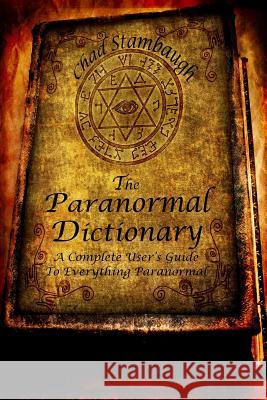The Paranormal Dictionary: A Complete Users Guide to Everything Paranormal » książka
The Paranormal Dictionary: A Complete Users Guide to Everything Paranormal
ISBN-13: 9781484887561 / Angielski / Miękka / 2013 / 742 str.
WINNER OF THE 2014 NON-FICTION BOOK OF THE YEAR at the 2014 Paranormal Awards. I've put this Dictionary together not just for the Paranormal Investigator, but for everybody in the paranormal field period. This book is for the person who studies Parapsychology, Ufology, Cryptozoology and all the other fields of expertise that falls under the paranormal realm. The words and definitions that are contained in this book is the most complete compilation that has ever been put together anywhere. The words and definitions that are in here have been extensively researched and cross checked for accuracy and truthfulness. The entries in this dictionary gives coverage to the most frequently used words in the paranormal field. The heart of the dictionary is the A-Z vocabulary sections; where readers will find information about meaning, spelling, and pronunciation. The Paranormal Dictionary was created by the same author that brought you "Paranormal Investigations; Chad Stambaugh." With over 2,500 words, this dictionary will be one of the best resources for a Paranormal Investigator ever to be found. I feel that this handy reference book should be put in everyone's equipment case right next to their EMF meter and voice recorder. You know it's great to know what every piece of equipment is and (hopefully) how to use it properly but this is only half the story. If you deal with clients and one of them describes to you that they saw a figure with no definitive shape or form and kind of misty looking. What are you going to tell them that they saw? If you say "oh you saw a shadow figure," you'd be totally wrong. Because what they are actually describing to you is an amorphous spirit. Or if you're a team leader and your training a new investigator and they want to correctly log down outside contamination on an EVP session? What are you going to tell them? Just log it as outside contamination (which to me shows your knowledge base is weak) or are you going to tell them correctly that it's called "spill-through.." Do you know how many phases to a demonic possession there is and what they are correctly called? Or do you know that there are two types of Catalepsy, but only one pertains to the paranormal? Do you even know what Catalepsy is? Its knowledge like this that (like I said in my first book) separates Ghost Hunters from the Paranormal Investigators. The ghost hunters are just out there doing whatever they want. Not trying to better them-selves and keeping this field from moving forward. It's the true paranormal investigator that is constantly learning their craft by gaining knowledge of their field, using the proper scientific terminology, so that when they speak to their clients or even explaining the paranormal field to a novice, they can come off as a competent practitioner of their craft, not an unintelligent quack. I know when I'm talking to a novice at a restaurant or on an airplane while I'm travelling somewhere, I want that person to get something real and understand what a paranormal investigator really does. I don't want to sound like a crazy unintelligent person. Because when I talk about the paranormal, I'm not just representing myself, I'm representing every single investigator in the field.
Zawartość książki może nie spełniać oczekiwań – reklamacje nie obejmują treści, która mogła nie być redakcyjnie ani merytorycznie opracowana.











